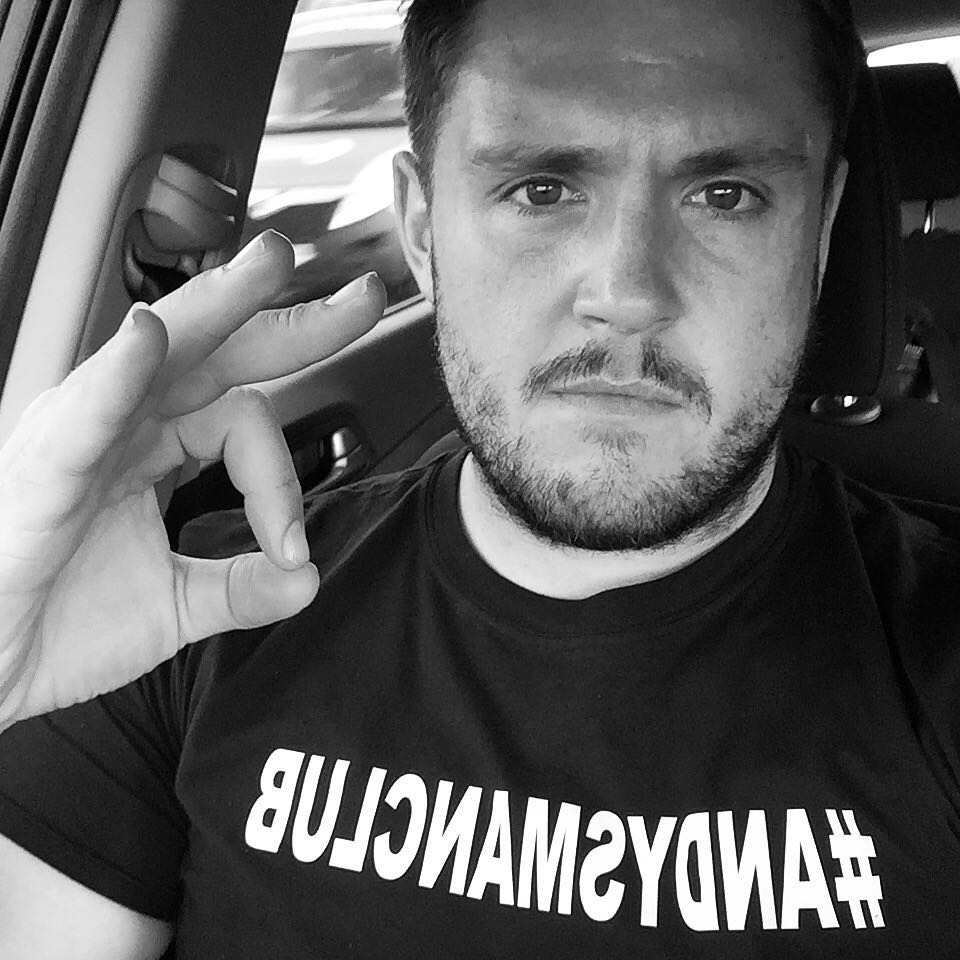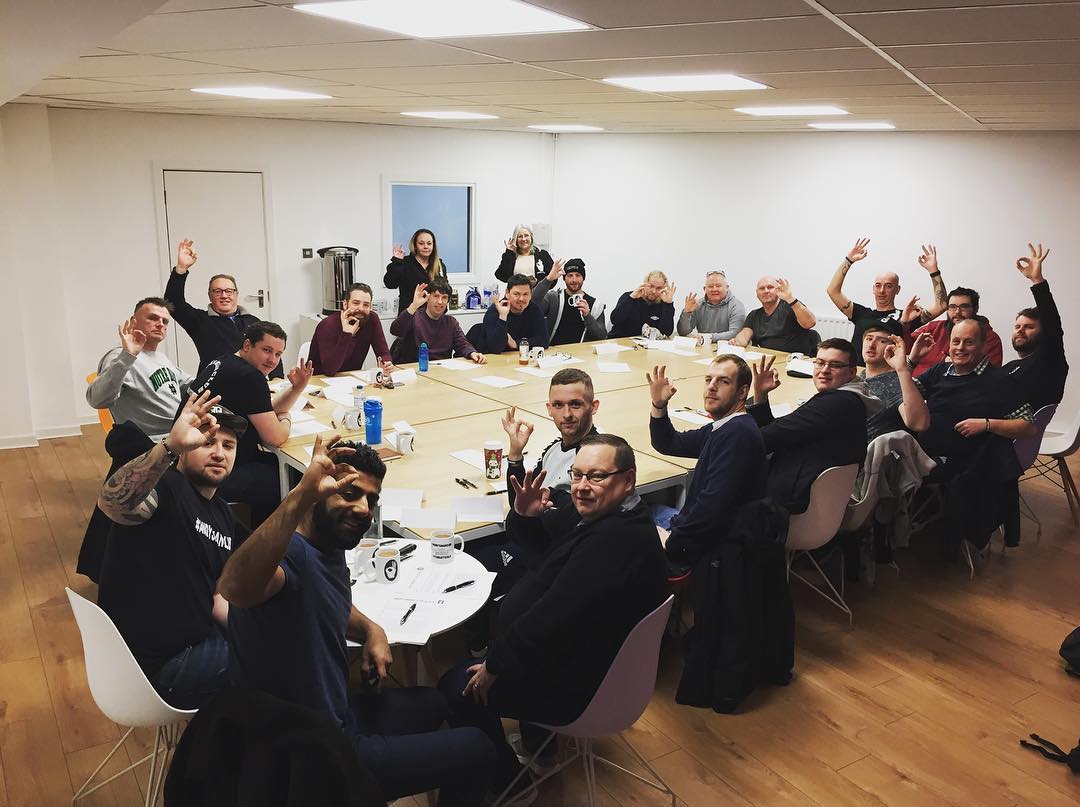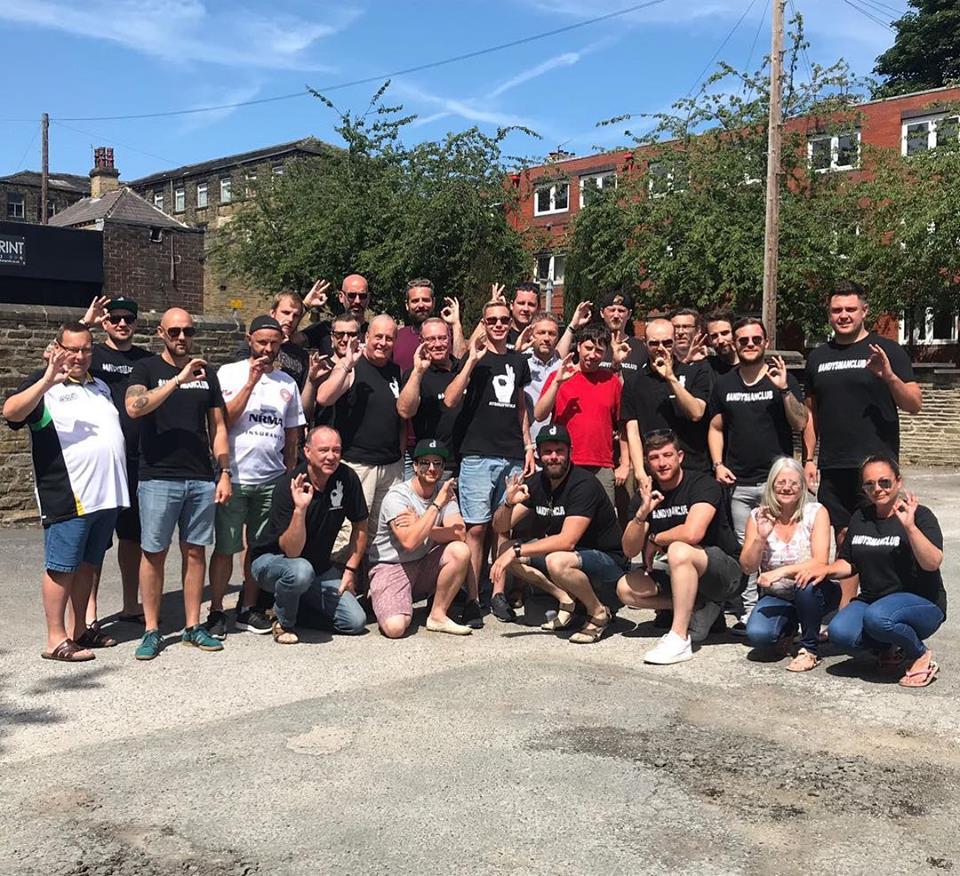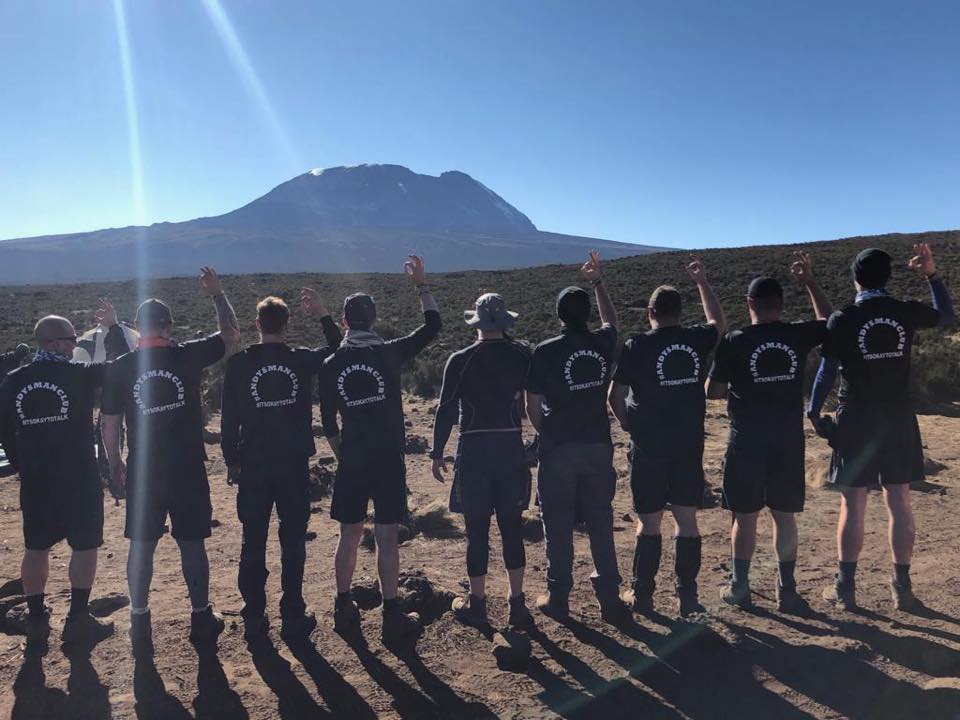What happens at Andy’s Man Club?
Mental Health
An interview with the man behind Andy's Man Club, Luke Ambler, which is doing incredible real-world work with men in the UK who need mental health help.
Andy Roberts was 23 years old when he killed himself. The resultant devastation that hit his family was also followed by something more positive – his brother-in-law, professional rugby player Luke Ambler, became determined to prevent as many families as he could from going through such a trauma. He formed a men’s group called Andy’s Man Club, which in two years has become one of the most important organisations working to help men today – their group sessions are changing the lives of hundreds who have hit rock bottom and are continuing to grow in number at a remarkable rate. Their success shows the depth of the problems out their for men, that they are crying out for such a place in which to share their issues, something which has traditionally been frowned upon. With Luke and his growing band of Andy’s Man Club members, the word is getting out there that we no longer need to keep our struggles to ourselves, and that true male bravery is about daring to open up, not burying your feelings away.
Here Luke tells us about the formation of the club and what you can expect if you attend one around the country.
Andy’s Story
On 3rd April, my brother-in-law Andrew is up at my house, and we’re having a bit of a laugh and a joke. Andy’s telling us he wants to buy a house, which was unbelievable to hear after his early days when he was in and out of prison. The last few years he had really turned his life around, not been in any trouble, had a beautiful daughter, good job and now he’s wanting to buy a house. A complete U-turn.
We were going to meet up on the Wednesday to go through it when the kids weren’t there. On 4th April, a Sunday, he went up to see his football team, and they managed to convince him to play – he was a good footballer, a proper lads’ lad. That afternoon he goes to the Palladium with his daughter and my two kids and me missus, while I’m playing rugby. That night he was snapchatting to his mates in the bath about a trip to Thailand they’re going on. He gets up in the morning, goes to work as normal, and then says goodbye to his mum. He buys a rope from B&Q and then he’s found hung Tuesday morning.
I get a phone call from my mother in law on the Tuesday, basically saying “Our Andrew’s dead,” so I shot to the house and saw devastation I’d never seen before. I’m from a big Irish family so I lost grandparents and aunties and uncles from a young age, but suicide is something else. I started having to tell people like me missus, the mother of his child and his daughter. I’ve always said the single hardest thing I’ve had to do was having to tell my little boy Alfie, who was six at the time. The screech he let out nearly knocked out the windows. It was that screech that led me to want to do something about it. I thought “What next? What can I do next?” I decided to find out why so many men were killing themselves. And then I decided to start a club in his name, called Andy’s Man Club.
The first club
The first night when we set it up we didn’t think anyone would come, and nine men turned up. At the time with me being a professional rugby player it sort of helped break some barriers down, and second week 15 men turned up. Two weeks later I decided to start a campaign. I took a selfie giving an ‘OK’ sign and within 4 weeks it had been done by 100 million people. It suddenly shot us into the stratosphere, everyone wanted to know about it.
We had a five year goal of getting 10 of these groups about the UK. We’re now two years old and we’ve got 17. We have around 350 men meeting up every week. The feedback is just sensational. The club really is saving lives.
What happens at Andy’s Man Club
You go to any club and they will all run the exact same. We set that model up so if you’re a truck driving and your club is in Devon, but you’re late on a ferry from Amsterdam and end up stuck in Hull, you can go to the Hull group, and it’ll be exactly the same.
You come in – there’ll be someone there meeting you outside saying come in in case theyre needed – you get a brew, you sit down with the rest of the lads and we get the ground rules out of the way:
No phones, or at least on silent if you’ve got an emergency.
Whatever is said in the room, stays in the room. A bit like Fight Club without the fighting. And then the other rule is we don’t talk about politics or religion or medication. Because we don’t want any alliances to anything, and some people need their medication and some people believe they don’t need their medication, but we’d rather the ones that do can still feel comfortable taking their medication.
Those are the ground rules. After that, your facilitator will say, “How’s your week been?” We’ve got a little football or rugby ball and we pass that around. People say how their week’s been. And then it follows on from there with, “What’s a positive from your week?” We start to make people think positively. Then we have “Anything to get off your chest?”
Those 3 questions are always there, and the last two questions always change. It might be something like, ‘What’s your goal between now and next week?’, or ‘Tell us someone who you appreciate in your life and why.” So it really starts to make people think positively.
And then after that people have a brew, and a bit of an open chat, and then everyone leaves. They can get added to a private Facebook group if they want, within their own group, and then they get support through the week from the guys in the group.
It’s beautiful when you see a guy who comes to a group for the first time, broken, and then four weeks later he’s telling someone else, ‘Don’t worry about it being your first night, I was there as well. If you need anything, message me.’ That’s beautiful, man.
Who are the men?
When guys come through the door, that’s the hardest step they’ll ever take. Some guys will stand outside a group for 3 to 6 weeks, just looking from the car, not daring to come in. Guys have been seen walking past multiple times until someone’s put a hand on their shoulder and said, “Are you looking for Andy’s Man Club?” One of our facilitator’s at the Bradford group said unless someone had put their hand on his shoulder that day to bring him in, he would have killed himself. He was dead set. He’s just one of thousands of lads who have come through that door and changed. Some guys run security companies or are directors at multinational companies, other guys who are currently homeless or off work with depression – the spectrum is so vast. But I think guys have been crying out for the safe space really. A non-judgemental environment where blokes can take their masks off and just be themselves.
Why it works
I think the reason why Andy’s Man Club works as well is that it’s real. I think everyone buys into it because whether you are a multi-millionaire or you are currently homeless, people feel that realness, they feel that rawness. There’s none of that box-ticking, there’s no signing in, it’s not funded, we don’t charge, everyone knows that every penny donated goes into a cause, we know we don’t pay staff, we don’t do any of that. Everyone is a volunteer, directly from Andy’s Man Club, and to have 17 clubs where blokes who have used the club or been affected or changed by the club, also open doors to help other men, there’s something special in that. One club has 14 facilitators because they got so many a week there. There’s this pool of guys, maybe 70, 80 guys, who are just helping other men now, and saving their lives.
Spreading the word
We have a good presence on social media. We might not have the biggest of followings, maybe 30,000 (update, now 142,000) on Facebook, but we have an active following. I’ve run many things in my life, but I’ve never seen so many people engage, sometimes a million engagements a month, which is scary. These people care about it. They say that one suicide can affect up to 60 people. I think you can flip that as well sometimes. When one person comes and it changes their life, it’s not just their life that gets saved, it might affect the wives, the daughters, the sons, their best friends, the father, and suddenly that spreads and people want to give back. I think it’s a movement. We could open another 112 clubs tomorrow but we like to do it the right way.
How it transforms people
I went to an event recently where the people didn’t know I was there, and I sat in the back. It was the Oldham one-year birthday and they got 12 guys up just to talk to the crowd about how their journey’s been with Andy’s Man Club. One said if it wasn’t for this club my wife wouldn’t have a husband. One guy said if it wasn’t for this club my daughter wouldn’t have a father, this club has saved my life. The other guy said I wasn’t suicidal but I was at the lowest point I’ve ever been in in my life. Life wasn’t getting better, but now it is.
One guy will always stand out, one guy called Oliver, who turned up to the very first session when there were 9 of his there, and he was the second person to ever hold the ball in the hand. He opened up that night and he was the lowest I’ve ever seen anyone. He was off work, he wasn’t seeing his kid, he was in such a bad place. He came to the club for a few months, and got his job back, then took up the courage to leave it and go get a better job, and he got promoted in that job. He now sees his kid, he’s got a new partner. And now he facilitates clubs, and has done for the last two years, he’s the leader of the biggest group we’ve got, in Halifax. He’s been to more sessions than anyone else has, he’s only missed three sessions in two years. He stands out because he was at rock bottom and now you could say he’s at the top of the mountain.
We’ve had men who have been at rock bottom and a month ago they did actually climb Kilimanjaro with us. They climb mental mountains and now they climb physical mountains.
How men use the club
It’s exactly how you want to use it. I always categorise the men who come in three categories. The first one is people who use it like church. They come in every Monday no matter what, they’ll cancel birthday parties to come. It becomes part of who they are, not just because they need it, but because they want to give back, so they come no matter what.
The second group of people use the group, they love the group, but when they feel better they go back and live their life. A few months later, when they start to have a dip, they come back.
The third group is what I call the blokiest of blokes. They’re the guys that are hardest to reach. They come, they open up, for one or two weeks, and then they go. But often they get enough out of a group during then one time or two times to offload, and then they go back and get back on with their lives.
So there’s a complete mix which is why it’s such a high turnover. One week you might have 350, but you have 40 new faces. It’s amazing really.
The effect beyond group time
Men say, ‘because of this group I’ve now starting speaking to my son about stuff, I can talk to my wife. It’s also given me the courage to maybe get more specialist help, debt management, or child access, or seeking professional help from a counsellor for my depression or bipolar.’ It gives them that courage to make that next step. We’ve got guys who say, ‘I’ve got mental health on the radar of my workplace.’ It seems to spread so fast because it’s real, there’s no bullshit. I use real language because it is. We don’t sugar coat anything.
People come and because of the positive leading questions, they leave the group feeling better. Naturally they can’t wait to have a good week and come back and tell you about the good week. People can feel guilty about having a good week but we encourage that. You want people to see that you can feel that bad but end up feeling that good.
The thinking behind the questions
I was playing rugby but my mum’s got a severe mental illness so I self-taught myself NLP, which is neuro-linguistic programming. We don’t really talk about that at the group, about what it’s based on, but it’s fairly simple. The guys have five questions which are what you’d call a shit sandwich.
‘How’s your week been?’ breaks the ice. Everyone can talk about that even someone who doesn’t want to talk. ‘Now give us a positive’ – it now swings back positive and now they’ve spoken twice. ‘Anything to get off your chest?’ – now they’re going to give some big stuff. It could be anything really deep or rock bottom stories. And then there’s two positive questions to finish.
So then they’ve got all this shit off their chest, but then the shit has been replaced with some good. Maybe one of the last questions will be something silly like tell us your favourite meal. It’s all about making them think of something positive, and making them leave feeling better than when they came in.
The atmosphere
It’s not clinical. It’s making mental health cool. It’s the way going to pub on a Friday used to be, but with a coffee, and where you have a chat with some blokes not just about the usual football and women, but where you can say, “I’m struggling, and this is why I’m struggling.”
People have respect for that and respect for other blokes. It’s powerful stuff.
What stops men talking
Three stigmas: One is burden, second is weakness, third is embarrassment. I’ll break them down.
With burden, I can guarantee you’ve been through some shit in your life and you’ve held it in from your missus or boyfriend, or your brother, or your mum and dad. You won’t tell them because you think they have their own shit to deal with, so they don’t need to burden them with that. We’ve all done that.
The next is weakness. From the historic idea that men used to go out and hunt meat while the women nurtured the kids and got the fire ready – I even look back at my little Irish nana, she would get stews and pies together while my grandad went to work. But social evolution changes things, long gone are the days when we used to go out and hunt meat, long gone are the days when we had to have that strong mask on. We can show weakness. And actually it’s not weak, it’s actually takes more of a man in my eyes. It takes greater strength to open up because it’s a lot harder to do. Anyone can bottle it up, but to be able to say, “Listen I’m struggling.” That takes real strength.
And the third one is embarrassment. We live in what I call a lad culture. A banter culture, where everyone is trying to have little jibes at each other, everyone’s trying to find something to have a bit of fun about, when actually there’s nothing to be embarrassed about with these issues. I’ve not met a human being on this planet that hasn’t been through a storm, is going through a storm or there’s a storm coming. So there’s nothing to be embarrassed about, you’re not going through a unique problem. Ask your next door neighbour, ask your work colleague, and you’ll find they’ve also struggled or are currently struggling.
The future
The next big goal for Andy’s Man Club is to have a 1000 men attending every week. I want to achieve that in the next 3 years. We will create more clubs in different areas so people can get access to us. Our clubs are a two hour drive from anywhere in the country – I’d like to get that down to an hour. And who knows overseas, we’ve had expressions of interest in America, Canada, in India, Germany, Switzerland. We want to keep growing and stop more families going through what our family went through.
Things are changing
I think after this ‘OK’ campaign that we did, there does seem to be more about these issues around men. The royals have started talking, and then CALM have being doing stuff with us saying its ok to talk. It just feels like men have started to open up, and there’s been a bit of a revolution in that sense.
But we have always said that we didn’t want to just tell people to talk. A lot of organisations say talk but we want to give people that platform that they can talk on. So that’s why we backed up the campaign with what it’s actually all about – yes, it’s ok to talk, but let’s give you somewhere to talk as well, which is Andy’s Man Club.
You can find out about how Andy’s Man Club helped create the fantastic Lock In Episode of Emmerdale here
To find out more about Andy’s Man Club or to find one in your area, visit andysmanclub.co.uk

Join The Book of Man
Sign up to our daily newsletter to read more about mental health, masculinity and relationships today...

Join The Book of Man
Sign up to our daily newsletters to join the frontline of the revolution in masculinity.
























